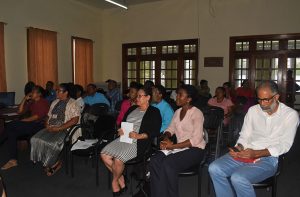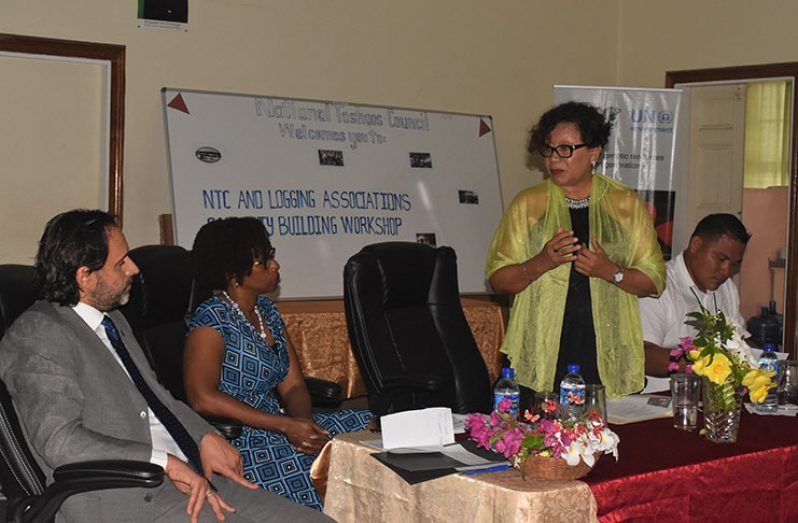SEVERAL indigenous leaders were on Tuesday reminded of the crucial role they play in the promotion of sustainable forestry in their communities.
This was conveyed at a three-day capacity-building workshop involving several indigenous villages and communities involved in logging activities. The ongoing forum, which was convened by the National Toshao’s Council (NTC) at that body’s secretariat at Hadfield and Cross Street, seeks to move the European Union Forest Law Enforcement Governance and Trade, Volunteer Partnership Agreement (EU FLEGT VPA) Process forward.
According to the Ministry of Indigenous Peoples’ Affairs, the EU FLEGT VPA’s main objective seeks to promote sustainable forestry in indigenous peoples’ communities through capacity-building and direct participation.
The initiative is in partnership with the European Union (EU), the Food and Agriculture Organization (FAO) and the Ministry of Indigenous Peoples’ Affairs and is being hosted at the NTC’s Hadfield and Cross Streets Secretariat.
Minister within the Ministry of Indigenous Peoples’ Affairs, Valerie Garrido-Lowe, who delivered the feature address, reminded those in attendance of the integral role the indigenous peoples have played and continue to play in preserving Guyana’s most sought-after resource.
According to the Minister, “logging in Guyana is big business; it is one of our country’s income generating industry. 87% of Guyana is forested and I know that Guyana retained most of its forest because of the indigenous peoples”.
Minister Garrido-Lowe said that the ongoing capacity-building session “is to just bring us back to what we, as indigenous people, are supposed to know a long time ago that was handed down to us from our ancestors, but also teaches us that it is the modern world and we need to keep up with what’s going on”.
She added that “Guyana is now being looked at as one of the saviour countries in the world, with regards to the Green State Development Strategy where we are promoting sustainable forest, a friendly environment and eco-tourism”.
EU Delegation representative, Frederico Suarez, emphasized that the most relevant aspect of the EU FLEGT VPA process is the “comprehensive and participatory approach from the public, private sectors and civil society and indigenous associations and the need to have inclusive dialogue that reflects the needs and interest of all of the forest management principles”.
He said the NTC “plays a crucial role in getting indigenous peoples interested in the VPA Process, and the fact that it comprises all of the indigenous Toshao’s and leaders from across Guyana makes the NTC a key stakeholder in ensuring good governance over this project, exploitation of the further use of other resources which are [timely] to the subsistence of life of indigenous communities.”

According to the release, FAO’s Country Representative, Dr. Gillian Smith, said her Organization is happy to partner with the EU and the NTC.“The Toshao’s Council earned this and is in a position, and has been in position where they are well organized on behalf of the indigenous peoples and they have every kind of skill set and experience and requirement to take a grant like this and implement it for the advantage of the indigenous people,” she said.
Dr. Smith said the FAO is aware that such projects experience its fair share of challenges “and we want to think of ourselves and we would like you to think of us as partners in these challenges; we all have the same goals and we want to see Guyana thrive and excel and we (FAO/EU) are here as partners to contribute to the vision of Guyana for Guyana”.
She encouraged leaders to take full advantage of this opportunity where they can gain additional knowledge “since there are hundreds of people who are depending on you to take the most you can out of this and bring it back and make it sustainable”.
According to the ministry, last April, the FAO signed a Letter of Agreement with the NTC to provide financing for the implementation of the project to the tune of approximately $US49,000 which has already seen scoping missions conducted and community support forest officers (young people) from nineteen villages received technical training.
The Technical Training was conducted by the Guyana Forestry Commission in the areas of Forest Management, Forest Law, Information Technology Skills and Technology Usage.
Villages participating in the workshop are Kwebanna, Manawarin and Waikrebi from Region 1; Wakapoa, Mashabo and Mainstay in Region 2; Batavia and Karrau in Region 7, Muritaro, Rivers View, Kimbia and Great Falls in Region 10.
The Voluntary Partnership Agreement (VPA) is a central element of the EU’s strategy in tackling illegal logging which forms part of a bilateral trade agreement between the EU and a timber- exporting country outside of the EU.
The VPA also guarantees that any wood exported from a timber producing country to the EU is legal and within an established framework beneficial to both sides.



.jpg)








